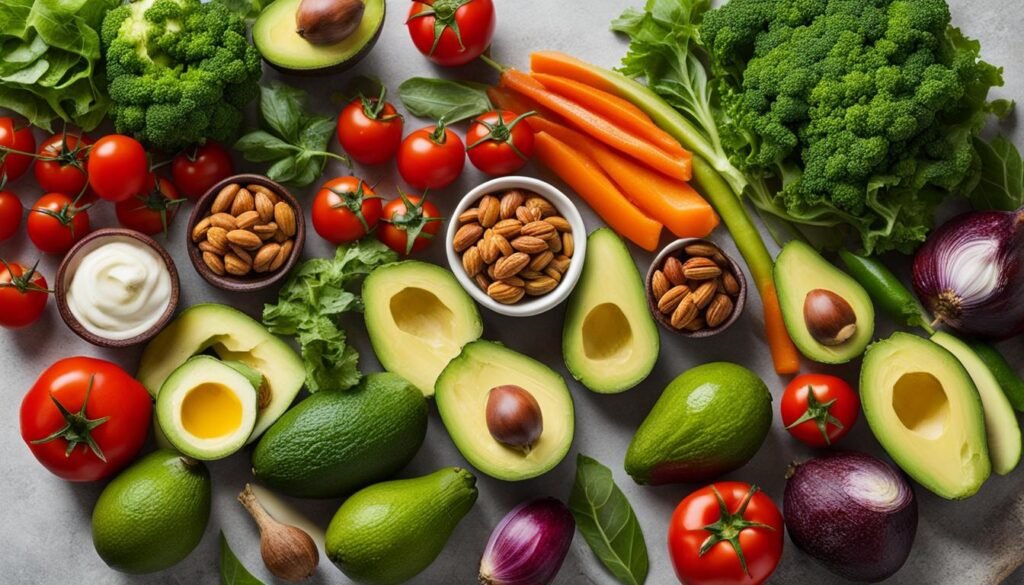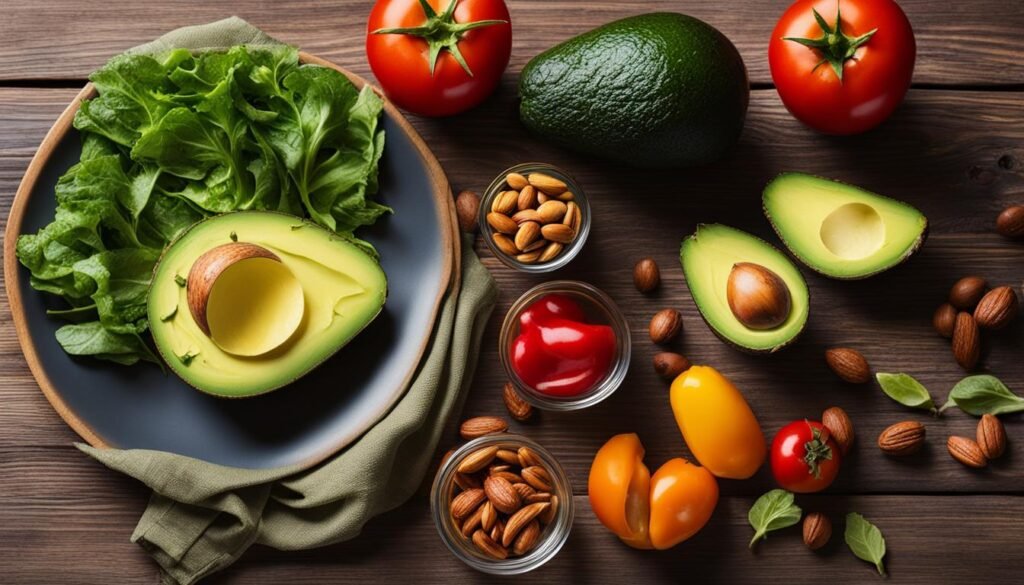Get our FREE E-Book HERE - 120 TIPS for Losing Weight & Bonus Tips for Postpartum Weight Loss & Dad’s Postpartum Experience
10 Easy Things You Can Do To Overcome Hunger During Intermittent Fasting

Intermittent fasting can be a powerful tool for weight management and overall health. However, it’s not uncommon to experience hunger pangs during fasting periods. But don’t worry, there are several simple strategies you can implement to combat hunger and stay on track with your fasting goals.

In this article, we’ll explore seven easy ways to manage hunger during intermittent fasting. From understanding the physiology of hunger during fasting to adopting mental strategies and incorporating specific foods and beverages, you’ll discover practical tips to help you navigate hunger and maintain your fasting schedule.
Key Takeaways:
- Plan your meals and fasting window to align with your body’s circadian rhythms.
- Reduce stress through meditation, exercise, or relaxation techniques to manage hunger.
- Utilize coffee and tea to curb hunger while staying within your fasting window.
- Incorporate low-carb, high-fat foods to provide satiety and stabilize blood sugar levels.
- Stay hydrated by drinking at least 2 liters (half a gallon) of water per day.
- Start with a low-carb and fat adaptation phase to ease hunger and improve energy levels.
- Stay mentally focused by adopting a positive mindset and using cognitive techniques to deter hunger thoughts.
Understanding Your Fasting and Feeding Schedule
To effectively combat hunger during intermittent fasting, it’s important to understand your fasting and feeding schedule. By aligning your meal times with your body’s circadian rhythms and knowing what to expect when starting intermittent fasting, you can optimize your fasting experience and reduce hunger.
The Physiology of Hunger During Fasting
During periods of fasting, the body undergoes physiological changes that can trigger feelings of hunger. The hormone ghrelin, also known as the “hunger hormone,” is released when the stomach is empty, signaling the brain that it’s time to eat. Understanding this process can help you better manage hunger during your fasting periods.
Aligning Meal Times with Circadian Rhythms
Circadian rhythms are the internal “body clocks” that regulate various physiological processes throughout the day, including hunger and metabolism. By aligning your meal times with these rhythms, you can work with your body’s natural cycles and optimize your fasting experience.
Research suggests that eating during the day and avoiding large meals at night can enhance the benefits of intermittent fasting.
What to Expect When Starting Intermittent Fasting
Starting intermittent fasting can be a new experience for your body, and it’s important to know what to expect during the initial stages. Some common experiences when starting intermittent fasting include initial hunger and cravings, changes in energy levels, and adjustments to meal timing.
By being mentally prepared for these changes, you can navigate them more effectively and stay committed to your fasting goals.
1. Reduce Stress
Stress can contribute to increased feelings of hunger during intermittent fasting. It’s important to find effective ways to manage and reduce stress to stay on track with your fasting goals.
By incorporating stress reduction techniques into your routine, you can better manage your hunger and maintain a successful fasting schedule.
One effective method for reducing stress during intermittent fasting is through meditation. Taking a few minutes each day to practice mindfulness can help calm your mind and alleviate stress.

By focusing on your breath and being present in the moment, you can achieve a state of relaxation and reduce stress levels.
Exercise is another powerful stress-reducing tool. Engaging in physical activity releases endorphins, which are natural mood boosters that can help combat stress.
Whether it’s going for a walk, doing yoga, or participating in a workout class, finding an exercise routine that you enjoy can greatly reduce stress and improve your overall well-being.
Incorporating relaxation techniques into your daily routine can also be beneficial for managing stress during intermittent fasting. This may include activities such as reading a book, taking a bath, practicing deep breathing exercises, or engaging in a hobby that brings you joy.
These activities can help you unwind, alleviate stress, and reduce feelings of hunger.
2. Hungry During Intermittent Fasting: Utilizing Coffee and Tea
Coffee and tea can be valuable allies in curbing hunger during intermittent fasting. While fasting, you can enjoy black coffee and herbal teas without breaking your fast, making them ideal choices to help you feel more satiated.
The effects of caffeine on hunger are notable, as it can increase energy levels and mobilize fatty acids. By incorporating coffee and tea into your fasting routine, you can reduce hunger and stay focused during your fast.
If you are a coffee lover, opt for a cup of black coffee, as it contains zero calories and no added sugars. The natural bitterness of black coffee can help suppress appetite and keep you satisfied. Additionally, black coffee provides a slight energy boost, making it an excellent choice to combat mid-fast slumps.

Herbal teas, such as green tea, chamomile, or peppermint, are also great options during intermittent fasting. These teas do not contain any calories and can provide a soothing effect on your stomach, helping to curb hunger.
Moreover, herbal teas have various health benefits and can contribute to overall well-being during fasting periods.
With their ability to keep you satiated and focused, coffee and tea can serve as valuable assets in your intermittent fasting journey. Remember to enjoy them within your fasting window, and leverage their effects to help you combat hunger and successfully achieve your fasting goals.
3. Eat Low-Carb, High Fat
Incorporating low-carb, high-fat foods into your diet during intermittent fasting can help control hunger. These types of foods provide satiety and can help stabilize blood sugar levels, reducing cravings and hunger pangs.
By focusing on nutrient-dense, high-fat options, you can better manage hunger and stay on track with your fasting goals. These foods not only keep you feeling full for longer, but they also support the production of ketones, which are utilized by the body for energy during periods of fasting.
Some examples of low-carb, high-fat foods include:
- Eggs: Eggs are an excellent source of protein and healthy fats. They can keep you feeling satisfied and energized throughout the day.
- Avocado: Avocado is rich in healthy fats and fiber, making it a great addition to salads, smoothies, or as a topping on low-carb dishes.
- Nuts and seeds: Almonds, walnuts, chia seeds, and flaxseeds are all high in healthy fats and can provide a satisfying crunch to your meals or snacks.
- Fatty fish: Salmon, mackerel, and sardines are packed with omega-3 fatty acids and provide a good source of protein to help keep you feeling full.
By incorporating these low-carb, high-fat foods into your intermittent fasting routine, you can reduce hunger and maintain your fasting schedule more easily.

4. Keep Your Hydration Levels High
Staying properly hydrated is crucial during intermittent fasting. Drinking an adequate amount of water can help reduce feelings of hunger, keep you feeling full, and support your overall well-being. Aim to drink at least 2 liters of water per day and consider incorporating electrolytes to replenish any losses during fasting.
Hydration plays a vital role in the success of your fasting journey. When you’re fasting, it’s important to ensure that you’re drinking enough water to keep your body functioning optimally. Water helps to fill your stomach, reducing hunger pangs and cravings. It also helps to flush out toxins from your body, aids digestion, and supports overall cellular function.
During intermittent fasting, it’s easy to forget to drink enough water, especially if you’re preoccupied with managing your meals and fasting schedule. However, dehydration can lead to increased feelings of hunger and fatigue. To avoid this, make a conscious effort to prioritize your hydration needs.
One effective strategy is to carry a water bottle with you wherever you go, ensuring that you have constant access to water. Set reminders or create a hydration schedule to ensure you’re drinking water regularly throughout the day. Infusing your water with a few slices of lemon, cucumber, or berries can add flavor and make it more enjoyable to drink.
“Drinking an adequate amount of water can help reduce feelings of hunger, keep you feeling full, and support your overall well-being.”
If you find plain water boring, you can also incorporate herbal teas or flavored sparkling water into your hydration routine. Just be mindful of the types of drinks you choose, making sure they don’t contain added sugars or calories that could break your fast.
Remember, staying hydrated is not only beneficial for managing hunger but also for your overall health. It’s important to listen to your body’s thirst cues and drink water accordingly.
By maintaining proper hydration levels, you can support your fasting goals and enhance your fasting experience.
5. Begin with Low-Carb and Fat Adaptation
When starting your intermittent fasting journey, it can be beneficial to begin with a low-carb and fat adaptation phase. This approach helps ease intermittent fasting hunger and cravings, allowing your body to gradually adjust to the fasting period.
Transitioning to fasting with a low-carb diet involves reducing your carbohydrate intake and increasing healthy fat sources. By doing so, you can shift your body into a state of fat adaptation.
In this state, your body becomes more efficient at using fat for fuel, which can help control hunger and improve energy levels during fasting periods.
Starting your intermittent fasting routine with a focus on low-carb and fat adaptation can enhance the effectiveness of your fasting journey. It sets the stage for improved hunger control and helps optimize your body’s ability to utilize fat as a fuel source.

By incorporating low-carb and high-fat foods into your diet, you provide your body with satiating options that promote a sense of fullness. This helps to stabilize blood sugar levels, reducing cravings and hunger pangs. Make sure to choose nutrient-dense, healthy fat sources such as avocado, nuts and seeds, olive oil, and fatty fish.
Remember, always consult with a healthcare professional before making any significant changes to your diet or starting a fasting regimen.
During intermittent fasting, managing hunger pangs can be a challenge. One strategy to help combat hunger is by incorporating carbonated water into your fasting routine. Carbonated water can create a feeling of fullness, helping to curb cravings and reduce hunger.
Why Carbonation Can Help You Feel Full
Carbonated water contains bubbles that can fill up your stomach, giving you a sense of satiety. When the carbon dioxide in the water reacts with your stomach acids, it creates gas, which expands your stomach slightly, triggering stretch receptors that send signals to your brain indicating that you’re full. This can help reduce the intensity of hunger pangs and make it easier to stick to your fasting schedule.
Choosing the Right Types of Carbonated Drinks
When selecting carbonated drinks to consume during fasting periods, it’s important to choose options that do not contain added sugars or calories. Opt for plain carbonated water or flavored varieties that are free from artificial sweeteners. These options will help you stay hydrated, manage hunger, and minimize the risk of breaking your fast.
7. The Role of Apple Cider Vinegar in Reducing Hunger
When it comes to managing hunger during intermittent fasting, apple cider vinegar (ACV) can be a valuable ally. Research has shown that ACV offers various health benefits, including its potential to reduce intermittent fasting hunger and promote feelings of fullness. By incorporating ACV into your fasting routine, you can effectively curb cravings and support your fasting goals.
ACV works by increasing the production of certain hormones that help regulate appetite. This can lead to a decrease in hunger and a greater sense of satisfaction, making it easier to adhere to your fasting schedule. Additionally, ACV has been found to slow down the rate at which food leaves the stomach, further contributing to feelings of fullness and reduced intermittent fasting hunger.
To reap the benefits of ACV during intermittent fasting, it’s best to consume it near the end of your fasting period or in the morning before breaking your fast. You can mix a tablespoon of ACV with water or incorporate it into salad dressings or other recipes.

It’s important to note that while ACV can be a helpful tool in managing intermittent fasting hunger, it’s not a magical solution. It should be used in conjunction with other strategies, such as maintaining a balanced diet, staying hydrated, and adopting a positive mindset.
By combining these approaches, you can optimize your fasting experience and achieve your desired results.
8. Mental Strategies for Managing Hunger During Intermittent Fasting
When it comes to managing hunger during intermittent fasting, it’s not just about the physical techniques. Your mental strategies play a crucial role in staying on track and achieving fasting success. By adopting a positive mindset and employing cognitive techniques, you can effectively deter hunger thoughts and cravings.
Adopting a Positive Mindset for Fasting Success
One of the most important mental strategies for managing hunger during fasting is adopting a positive mindset. Instead of viewing hunger as a burden or obstacle, see it as a sign that your body is adapting and burning stored fat.
Embrace hunger as part of the fasting journey and focus on the long-term benefits it can bring, such as weight loss, improved insulin sensitivity, and increased autophagy.

Visualize the goals you want to achieve through fasting, whether it’s fitting into your favorite pair of jeans or improving your overall well-being. By shifting your mindset and cultivating a positive outlook, you’ll be more motivated to stick with your fasting schedule and resist the urge to give in to hunger.
Cognitive Techniques to Deter Hunger Thoughts
In addition to adopting a positive mindset, cognitive techniques can help deter hunger thoughts and cravings. Here are a few strategies you can try:
- Distraction: Engage in activities that divert your attention away from food. Whether it’s reading a book, going for a walk, or practicing a hobby, keeping your mind occupied can help reduce the focus on hunger.
- Positive self-talk: Use positive affirmations to reinforce your commitment to fasting. Remind yourself of the reasons why you chose intermittent fasting and the benefits it can bring to your overall health.
- Mindfulness: Practice mindfulness techniques, such as deep breathing or meditation, to cultivate awareness of your body and thoughts. This can help you observe hunger sensations without impulsively giving in to them.
- Seek support: Connect with a community of like-minded individuals who are also fasting. Join online forums or seek support from friends or family members who understand and support your fasting journey. Sharing experiences and encouraging each other can enhance your motivation and strengthen your commitment to fasting.
By integrating these cognitive techniques into your fasting routine, you can effectively manage hunger and stay on track with your goals.
Remember, managing hunger during intermittent fasting is not just about the physical aspect but also the mental aspect. Adopting a positive mindset and utilizing cognitive techniques can help you navigate hunger and achieve long-term fasting success.
9. Staying Active and Distracted to Combat Cravings
If you are feeling hungry during intermittent fasting, staying active and finding distractions can be helpful in managing cravings and hunger. Engaging in physical activity, pursuing hobbies, or occupying yourself with tasks can divert your attention away from food and help reduce cravings. By staying active and finding ways to keep yourself busy, you can better navigate through periods of hunger and stay on track with your fasting schedule.

Physical activity, such as going for a walk, doing yoga, or participating in a workout routine, can not only distract you from cravings but also release endorphins, which can improve your mood and provide a sense of satisfaction. Additionally, finding activities that you enjoy, such as painting, reading, or playing a musical instrument, can provide mental stimulation and help take your mind off fasting hunger.
Distractions can be an effective way to manage hunger during intermittent fasting. By redirecting your focus and engaging in activities that you enjoy, you can create a positive outlet for your energy and cravings. Experiment with different activities and find what works best for you in maintaining an active and distraction-filled lifestyle while fasting.
10. Regulating Your Sleep Pattern to Support Fasting
Sleep plays a crucial role in hunger regulation and overall health. The relationship between sleep and hunger is interconnected, and improving your sleep quality can help support your fasting goals. By prioritizing quality sleep and implementing tips for enhancing sleep during fasting periods, you can better manage hunger and optimize your fasting experience.

The Relationship Between Sleep and Hunger
Sleep deprivation can disrupt the balance of hormones that regulate hunger, leading to increased cravings and a higher likelihood of overeating. Lack of sleep has been associated with elevated levels of the hunger hormone ghrelin and decreased levels of the hormone leptin, which signals fullness. This hormonal imbalance can make it more challenging to stick to your fasting schedule and control your hunger.
On the other hand, getting sufficient sleep can help regulate these hunger hormones, promoting feelings of fullness and reducing cravings. Quality sleep can also improve insulin sensitivity and blood sugar control, which are essential for successful fasting.
Tips for Enhancing Sleep Quality During Fasting Periods
Here are some tips to enhance sleep quality and support your fasting goals:
- Stick to a consistent sleep schedule: Go to bed and wake up at the same time every day, even on non-fasting days. Consistency helps regulate your body’s internal clock and improve sleep quality.
- Create a sleep-friendly environment: Make sure your sleep environment is cool, dark, and quiet. Use blackout curtains, earplugs, or a white noise machine to minimize distractions that may disrupt your sleep.
- Avoid stimulants close to bedtime: Limit your consumption of caffeine, nicotine, and other stimulants, as they can interfere with sleep. Aim to avoid them for at least four to six hours before bedtime.
- Establish a bedtime routine: Wind down before bed by engaging in relaxing activities such as reading, taking a warm bath, or practicing mindfulness techniques. A soothing routine signals to your body that it’s time to sleep.
- Avoid heavy meals and intense exercise before bedtime: Eating a large meal or engaging in intense physical activity close to bedtime can make it harder to fall asleep. Instead, opt for light, nutrient-dense snacks and gentle stretching or relaxation exercises.
- Limit exposure to electronic devices: The blue light emitted by screens can interfere with melatonin production and disrupt your sleep. Try to avoid electronic devices, such as smartphones and tablets, for at least one hour before bed.
- Consider sleep-promoting supplements: Certain herbal supplements, like valerian root or chamomile, may help promote relaxation and improve sleep quality. However, consult with a healthcare professional before starting any new supplement.
By incorporating these tips into your routine, you can enhance your sleep quality and support your fasting journey. Remember, quality sleep is an essential component of overall well-being and can significantly impact your success in managing hunger during intermittent fasting.
Eye Opening Quotes From Dr. Jason Fung Regarding Hunger During Intermittent Fasting
Dr. Jason Fung, the Canadian Nephrologist who is most known for his New York Times Best Sellerbooks “The Obesity Code” and “The Complete Guide to Fasting”, had to say the following regarding feeling hungry during intermittent fasting:
“The number one worry about fasting is that people think that they’re going to get more and more hungry if they don’t eat until they’re completely consumed by the hunger, luckily that’s not true” – Contrary to popular belief, fasting does not lead to an uncontrollable increase in hunger.
“Intermittent fasting causes hunger levels to peak and then fall like a wave, with hunger decreasing after the body has used calories from body fat.”
“If you have a child who is itchy, the last thing you want to do is scratch it. It’s the same with cravings, if you feed them, they will only get worse.”
“Planning ahead and having others eat outside the house can help resist temptation and make fasting easier.”
Conclusion
Embracing Hunger as Part of the Fasting Journey
Intermittent fasting can be a challenging but rewarding journey towards achieving your health and wellness goals. One important aspect of this journey is learning to embrace and understand hunger as a natural part of the fasting process. By accepting that occasional feelings of hunger are normal, you can shift your mindset and approach fasting with a positive attitude.
Leveraging These Strategies for Long-Term Fasting Success
Throughout this article, we have explored various strategies to help you combat hunger during intermittent fasting. By applying these strategies, you can set yourself up for long-term fasting success. Remember to align your meal times with your body’s natural rhythms, incorporate low-carb and high-fat foods into your diet, stay hydrated, and find distractions and activities to keep yourself engaged. By understanding the physiological and psychological aspects of hunger and implementing these techniques, you can achieve your fasting goals and experience the numerous benefits of intermittent fasting.
FAQ
What are some easy ways to combat hunger during intermittent fasting?
There are several strategies you can use to manage hunger during intermittent fasting. Some effective methods include aligning your meal times with circadian rhythms, reducing stress, drinking coffee or tea, incorporating low-carb high-fat foods, staying hydrated, starting with a low-carb and fat adaptation phase, using carbonated water, trying apple cider vinegar, employing mental strategies, staying active and distracted, and regulating your sleep pattern.
How does the physiology of hunger during fasts affect our hunger levels?
During fasts, hormones like ghrelin are released, which can trigger feelings of hunger. Understanding the physiology of hunger during fasts can help you better navigate hunger and maintain your fasting schedule.
How can I align my meal times with my body’s circadian rhythms to reduce hunger?
Aligning your meal times with circadian rhythms can optimize your fasting experience and reduce hunger. This involves eating during the daylight hours and fasting during the evening and nighttime.
What should I expect when starting intermittent fasting?
When starting intermittent fasting, it’s common to experience initial challenges such as increased hunger. Knowing what to expect can help you mentally prepare and stay committed to your fasting goals.
How can I reduce stress during intermittent fasting?
Stress can contribute to increased feelings of hunger during intermittent fasting. Effective stress reduction techniques include meditation, exercise, and relaxation techniques. By finding ways to reduce stress, you can better manage your hunger and stay on track with your fasting goals.
Can drinking coffee and tea help curb hunger during intermittent fasting?
Yes, black coffee and herbal teas can be powerful tools for curbing hunger during intermittent fasting. These beverages can be consumed without breaking your fast and can help make you feel more satiated. The caffeine in coffee and tea can also increase energy levels and mobilize fatty acids, reducing hunger and improving focus during your fast.
What to eat if hungry during intermittent fasting?
Incorporating low-carb, high-fat foods into your diet during intermittent fasting can help control hunger. These foods provide satiety and help stabilize blood sugar levels, reducing cravings and hunger pangs. By focusing on nutrient-dense, high-fat options, you can better manage hunger and stay on track with your fasting goals.
Why is staying hydrated crucial during intermittent fasting?
Staying properly hydrated is crucial during intermittent fasting. Drinking an adequate amount of water can help reduce feelings of hunger, keep you feeling full, and support your overall well-being. Aim to drink at least 2 liters of water per day and consider incorporating electrolytes to replenish any losses during fasting.
Is starting with a low-carb and fat adaptation phase beneficial for managing hunger?
Yes, starting intermittent fasting with a low-carb and fat adaptation phase can help ease hunger and cravings. By gradually reducing your carbohydrate intake and increasing healthy fat sources, you can transition your body into a state of fat adaptation, where it becomes more efficient at using fat for fuel. This can help reduce hunger and improve energy levels during your fasting periods.
How can carbonated water help manage hunger pangs during intermittent fasting?
Carbonated water can be a helpful tool for managing hunger pangs during intermittent fasting. The bubbles in carbonated water can create a feeling of fullness, helping to curb cravings and reduce hunger. It’s important to choose the right types of carbonated drinks that do not contain added sugars or calories to ensure they don’t break your fast.
Can apple cider vinegar help reduce hunger during intermittent fasting?
Yes, apple cider vinegar (ACV) has been shown to have various health benefits, including reducing hunger and promoting feelings of fullness. Incorporating ACV into your fasting routine can help curb cravings and support your fasting goals. It’s best to take ACV near the end of your fast or in the morning for optimal results.
What mental strategies can I use to manage hunger during intermittent fasting?
Managing hunger during intermittent fasting also requires mental strategies. Adopting a positive mindset can help you stay focused and motivated, while cognitive techniques can help deter hunger thoughts and cravings. By shifting your mindset and using specific techniques, you can better manage hunger and stay on track with your fasting goals.
How can staying active and finding distractions help combat cravings and manage hunger?
Staying active and finding distractions can help combat cravings and manage hunger during intermittent fasting. Engaging in physical activity, hobbies, or tasks can divert your attention away from food and reduce cravings. By staying active and finding ways to keep yourself busy, you can better navigate hunger and stay on track with your fasting schedule.
How does sleep play a role in hunger regulation during intermittent fasting?
Sleep plays a crucial role in hunger regulation and overall health. The relationship between sleep and hunger is interconnected, and improving your sleep quality can help support your fasting goals. By prioritizing quality sleep and implementing tips for enhancing sleep during fasting periods, you can better manage hunger and optimize your fasting experience.
How should I embrace hunger as part of the fasting journey?
Hunger is a natural part of the fasting journey, and by embracing it and utilizing the strategies discussed in this article, you can successfully combat hunger during intermittent fasting. By understanding the physiological and psychological aspects of hunger, adopting effective techniques, and implementing long-term strategies, you can achieve your fasting goals and experience the benefits of intermittent fasting.
Click here for more information on Intermittent Fasting
Source Links
- https://www.span.health/blog/guide-to-hunger-while-intermittent-fasting
- https://scitechdaily.com/8-ways-to-curb-cravings-during-intermittent-fasting/
- https://www.linkedin.com/pulse/8-tips-curb-your-hunger-while-intermittent-fasting-the-leansquad
- https://academic.oup.com/endo/article/147/1/23/2499980
- https://insights.ovid.com/crossref?an=01938924-201802000-00016
- https://www.sciencedirect.com/science/article/pii/S1550413118302535








